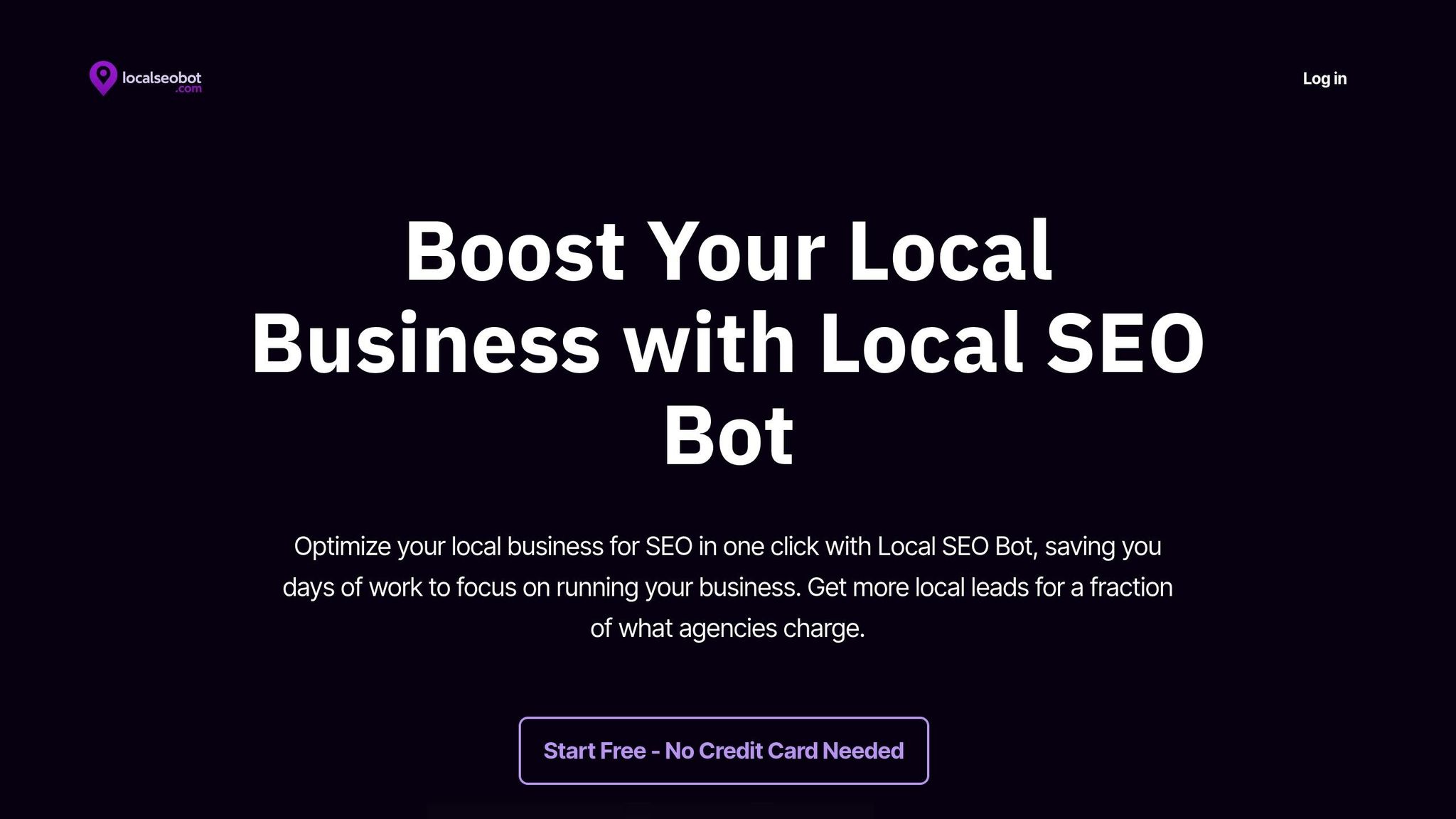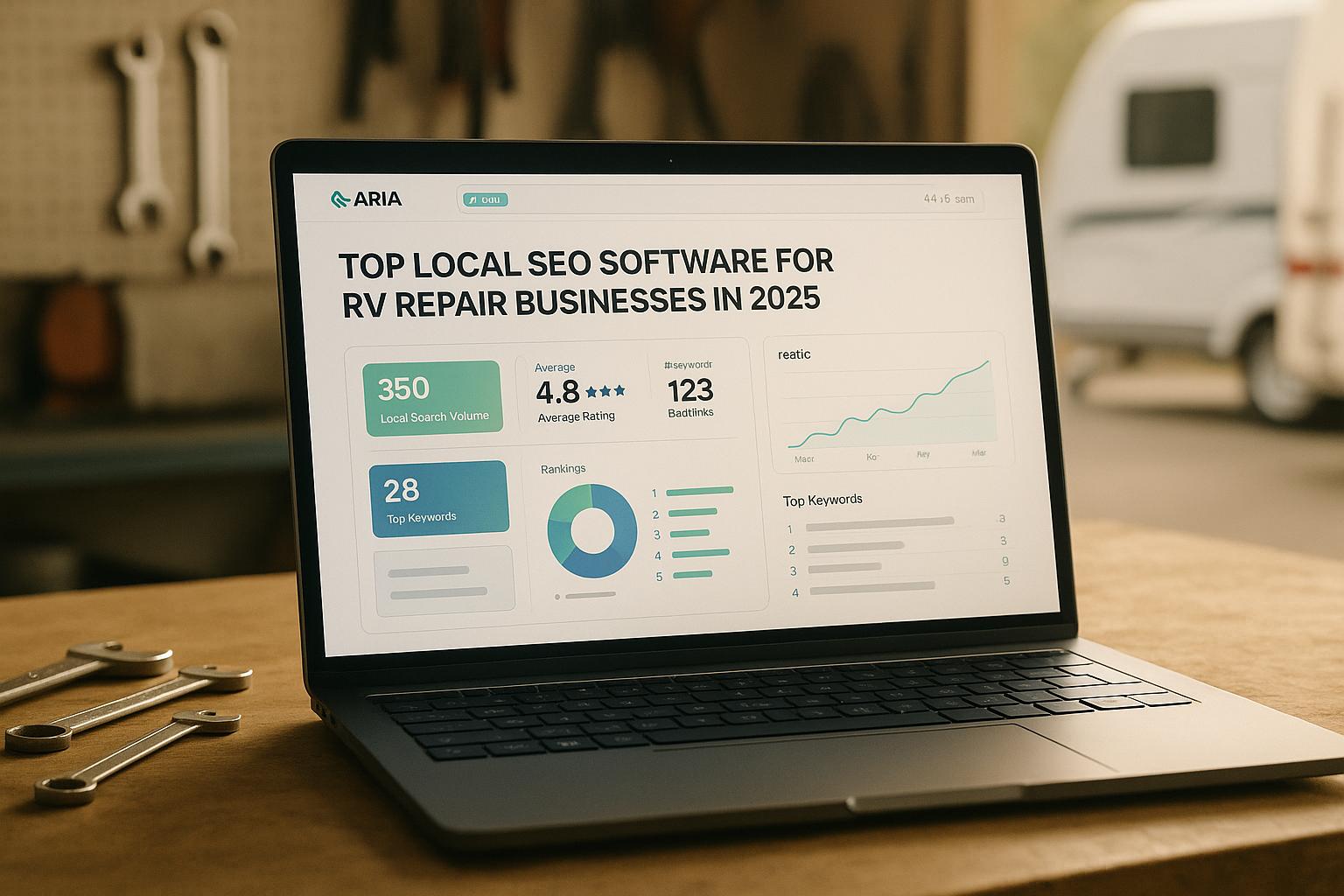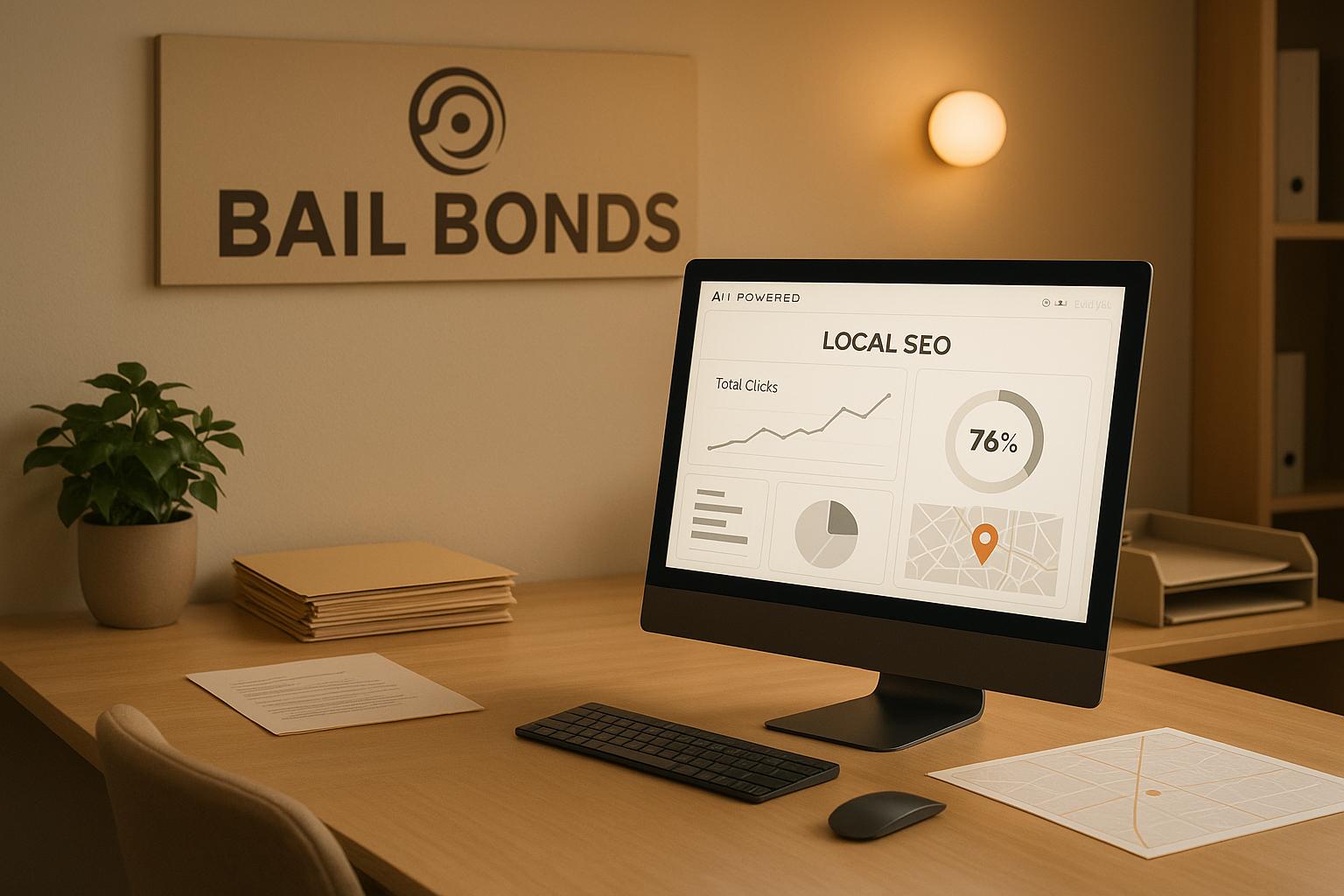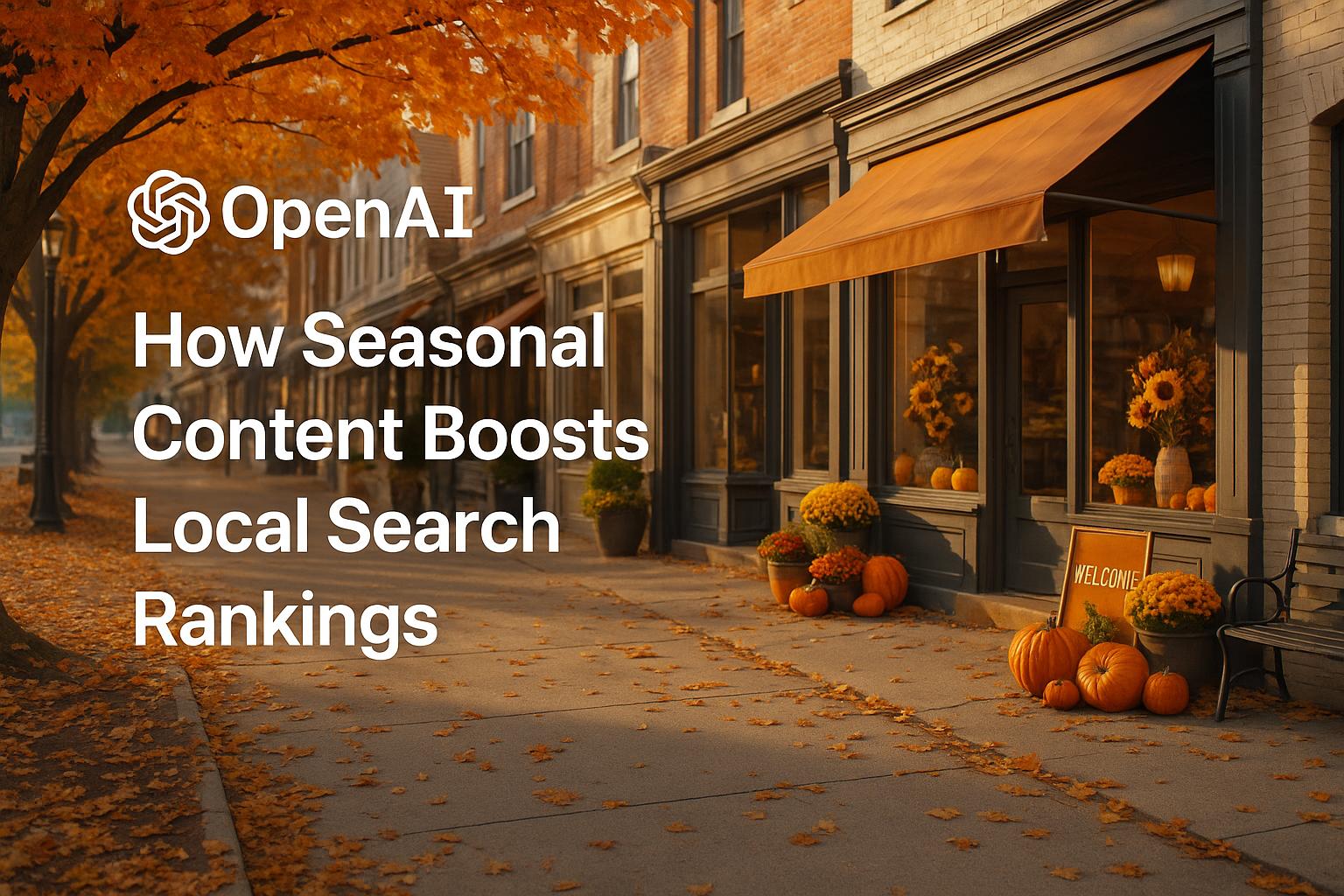Want to improve your local search rankings? Start with citation building. Citations are mentions of your business's name, address, and phone number (NAP) on other websites. They help search engines verify your business's legitimacy and make it easier for customers to find you online. Here's how to get started:
- Organize your business details: Ensure your NAP is consistent everywhere.
- Audit existing citations: Check for inaccuracies or outdated information.
- Claim key listings: Focus on platforms like Google Business Profile, Yelp, and Bing Places.
- Expand to other directories: Add your business to industry-specific and local platforms.
- Keep citations updated: Regularly review and maintain accuracy.
Tools like Local SEO Bot can simplify citation management, saving you time while keeping your information consistent. Building citations isn't a one-time task, but with regular updates, your business can strengthen its online presence and attract more local customers.
How to Easily Build Local Citations (Step-by-Step Tutorial)
How to Build Citations: Step-by-Step Process
Building citations doesn’t have to be overwhelming. By following a clear, step-by-step approach, you can ensure your business information is accurate and consistent across the web.
Gather Your Business Information
The first step is to organize all your business details. Consistency is key here - use the same format for your business name, address, and phone number (commonly referred to as NAP) across all platforms.
For example, if your legal business name is "ABC Plumbing Co.", use that exact name everywhere. When it comes to your address, decide on a specific style - like "123 Main Street" versus "123 Main St." - and stick with it. Similarly, format your phone number consistently, such as (555) 123-4567.
In addition to NAP details, prepare other essential information:
- A 150-200 word business description that highlights your services and what sets you apart.
- Your hours of operation, formatted uniformly (e.g., "Monday-Friday: 9:00 AM - 6:00 PM").
- Website URL and relevant business categories.
Having this information ready will save time and ensure uniformity across all your listings.
Check Your Current Citations
Chances are, your business already has some citations out there - whether created by search engines, customers, or automated systems. Unfortunately, these often contain outdated or incorrect details.
Start by searching your business name in quotes on Google. Review the first few pages of results for directory listings and review sites. Google Maps is another great tool to verify the accuracy of your business information.
Document your findings in a spreadsheet. Include columns for the platform name, the current details listed, and any issues you notice (e.g., old phone numbers, previous addresses, or duplicate entries). This will help you prioritize which listings need attention.
Claim and Improve Your Listings
Once you’ve identified your existing citations, focus on claiming and optimizing the most important ones. Start with platforms that have the biggest impact on local search visibility, such as Google Business Profile.
Here are some key platforms to prioritize:
- Google Business Profile: Verify your listing via postcard, phone, or email. This is crucial for appearing in local search results.
- Yelp: Create a free business account and claim your listing.
- Bing Places for Business: Ensure visibility within Microsoft’s ecosystem by completing verification.
Fill out every section of these profiles completely. Add high-quality photos, a detailed business description with relevant keywords, your hours, accepted payment methods, and any special services or certifications. The more complete and visually appealing your profiles are, the better they’ll perform.
Once your primary listings are in great shape, move on to expanding your presence on additional directories.
Add Your Business to More Directories
After optimizing the major platforms, broaden your reach by adding your business to other directories that your customers frequently use.
For example:
- Facebook Business Pages are great for both citation value and engaging with customers.
- Apple Business Connect ensures your business appears correctly in Apple Maps and Siri results.
- Industry-specific directories like Angi (formerly Angie’s List) or HomeAdvisor are perfect for contractors, while restaurants can benefit from platforms like OpenTable and Grubhub. Legal professionals should focus on directories like Avvo and FindLaw.
Don’t overlook local opportunities, such as city business directories, chamber of commerce websites, and regional platforms. Fully complete each profile and include photos where possible - this extra effort can make your listing stand out.
Keep Citations Updated
The work doesn’t stop once your citations are built. Keeping them accurate and up-to-date is an ongoing task.
Use a spreadsheet to track all your citations, including platform names, login credentials, and the date they were last updated. If your business information changes - like a new phone number or address - update your Google Business Profile first, then work through your other listings in order of importance.
Aim to review and update your citations at least quarterly. Watch for duplicate entries, as they can confuse customers and search engines. If duplicates exist, contact the platform’s support team to merge or remove them.
Finally, note which platforms allow direct updates and which require you to go through customer support. This will save you time when making changes in the future.
Best Citation Sites for US Small Businesses
Once you've claimed your business listings, it's time to focus on the quality of citation sites to strengthen your local SEO. Some platforms carry more weight in search rankings, while others are excellent for connecting with customers in your niche. Prioritize platforms that align with your industry for the best results. Below, you'll find some of the top citation sites tailored for small businesses in the US.
Main General Directories
These directories are the backbone of any citation strategy. They have large user bases, strong domain authority, and are frequently referenced by search engines when determining local rankings.
- Google Business Profile: This is a must-have for every local business. It's free and directly impacts your visibility on Google Maps. Customers can leave reviews, view photos, and contact you through your profile. Plus, you can showcase your services, post updates, and answer questions - all in one place.
- Yelp: A key platform for local discovery, especially for restaurants, retail stores, and service providers. Yelp's review system heavily influences consumer decisions, and its listings often rank high in search results.
- Bing Places for Business: While Bing's market share is smaller than Google's, it still reaches a significant audience, particularly within Microsoft's ecosystem, including Windows devices and voice searches.
- Apple Business Connect: Ensures your business appears accurately on Apple Maps, Siri, and other Apple services. This is particularly important for engaging mobile users.
- Better Business Bureau (BBB): A BBB listing adds credibility and trust signals valued by both customers and search engines. Accredited listings can boost your reputation, though accreditation typically comes with an annual fee, which varies by location and business size.
Industry-Specific Directories
Specialized directories can drive targeted leads by catering to niche audiences. These platforms often face less competition and connect you with customers who are specifically looking for your services.
- Home Services: Platforms like HomeAdvisor, Angi (formerly Angie's List), and Thumbtack are excellent for contractors, plumbers, electricians, and other service providers looking to connect with homeowners.
- Healthcare: Listings on Healthgrades, WebMD, and Zocdoc help patients find doctors and read reviews, making them essential for healthcare providers.
- Legal Services: Lawyers can benefit from directories like Avvo, FindLaw, and Martindale-Hubbell. These platforms offer detailed profiles and ratings based on experience and client feedback.
- Restaurants and Food Businesses: Use OpenTable for reservations, Grubhub and DoorDash for delivery services, and TripAdvisor for tourism-related dining. Each platform serves a unique purpose while enhancing your online presence.
- Retail: Platforms like Foursquare (now Swarm) and niche directories specific to your product category can also boost visibility for retail businesses.
Social Media and Local Platforms
Social media platforms aren't just for engagement - they also serve as valuable citation sources that contribute to your local SEO.
- Facebook Business Pages: Essential for nearly every local business, Facebook allows you to collect reviews, promote events, and communicate directly with customers. Its local search features also strengthen your citation profile.
- LinkedIn Company Pages: Ideal for B2B service providers, consultants, and professional services. While not a traditional citation site, LinkedIn profiles often appear in search results and provide valuable backlinks to your website.
- Instagram Business Profiles: Particularly effective for businesses in visual industries, Instagram's location tagging and visual content can improve local discoverability.
- Nextdoor: This platform focuses on neighborhood-level connections, making it perfect for businesses serving local communities. It's especially effective for home services, pet care, and other industries relying on nearby customers.
Don’t overlook local chamber of commerce websites, city business directories, and regional platforms. These resources often have strong authority, boost location-specific searches, and provide networking opportunities to connect with other businesses in your area.
sbb-itb-0e6533f
Citation Building and Management Tools
Keeping track of citations across multiple directories can be a daunting task for small businesses. That’s where tools like Local SEO Bot come in, offering a streamlined way to handle citation building and management. This not only saves time but also ensures your business details stay accurate and consistent everywhere they appear online.
Local SEO Bot Overview

Local SEO Bot simplifies local SEO for small businesses by automating key tasks. Its standout feature is one-click optimization, which updates your business information across directories with minimal effort. Thanks to its integration with Google Business Profile, you can manage all your listings from one dashboard. Whether it’s updating your business hours, phone number, or address, any changes are automatically reflected across your citations - no manual updates required.
The platform also includes a local SEO audit tool that gives you a detailed breakdown of your citation health. It highlights missing listings and inconsistencies, offering clear recommendations to improve your visibility in local search results. By automating these tedious tasks, Local SEO Bot allows you to focus more on running your business while steadily enhancing your local online presence.
Up next, we’ll explore practical strategies for maintaining accurate and up-to-date citations.
How to Maintain Your Citations
Creating citations is just the first step. The real challenge lies in keeping them accurate and consistent as time goes on. Businesses evolve - whether it’s a new phone number, updated hours, or even a change in location. Plus, customer reviews and duplicate listings can pop up unexpectedly. Regular updates are crucial to ensure your business information stays reliable.
Regular Checks and Updates
Once your citations are set up, maintaining them is key to ensuring they remain effective. Business details can shift frequently - you might add holiday hours, move to a new address, or change your website URL. Every update needs to be reflected across all platforms to avoid confusion.
Schedule quarterly reviews of your most important citations. Focus on directories like Google Business Profile, Yelp, Facebook, Apple Maps, and any platforms specific to your industry. During these reviews, confirm that your business name, address, phone number, website, and hours of operation are consistent everywhere.
If your hours change seasonally, update them promptly to avoid frustrating customers or earning negative reviews.
Start with Google Business Profile, as it has the most influence on local search rankings. Then move to high-traffic directories like Yelp and Facebook before tackling smaller, niche platforms.
Keep a record of updates. Maintaining a log of changes makes future reviews faster and ensures you don’t overlook smaller directories where your business is listed.
Monitor and Reply to Customer Reviews
Accurate details are important, but engaging with customer reviews is just as critical. Reviews on citation platforms play a direct role in your local search visibility and customer trust. Responding to reviews also signals to search engines that your business is active and attentive.
Check your primary platforms every two weeks and aim to respond to all reviews within 48 hours. For positive reviews, a brief, personal response is best. Thank the customer by name if possible, and reference something specific about their experience.
Handle negative reviews carefully. Address the issue directly, apologize for any inconvenience, and offer to resolve the matter offline. Avoid arguing or sounding defensive in public responses. Instead, provide your contact details and invite the customer to discuss their concerns privately.
Set up review alerts on platforms like Google Business Profile to get notified as soon as new reviews are posted. Quick responses show customers - and search engines - that you value feedback.
Look for recurring themes in your reviews across platforms. If multiple customers highlight the same problem, it may point to an operational issue that needs fixing. Taking action based on this feedback not only improves your business but also demonstrates active management of your online presence.
Delete Duplicate or Old Listings
Duplicate citations can confuse search engines and hurt your local rankings. They’re often created when businesses move, change names, or when directories pull incomplete data to auto-generate listings.
Search for your business name in quotes on Google, along with variations of your address and phone number. Look for outdated listings, slight name differences, or old addresses. These duplicates can weaken your citation authority and mislead customers.
Most directories have processes for removing duplicates. For Google, use the "Suggest an edit" feature to report them. On other platforms, look for options like "Claim this listing" or "Business owner" in their help sections. Keep a record of your removal requests for reference.
If you can’t get a duplicate removed, claim it and update the information to match your current details. Add a note in the description directing customers to your main listing. While not ideal, this prevents conflicting information from spreading.
Outdated listings from previous locations are particularly problematic. If you’ve moved, ensure your old address doesn’t appear in active citations. These can confuse customers and undermine your local SEO efforts for your current location.
Staying on top of your citations takes effort, but it’s essential for maintaining your local search visibility. Consistent updates and engagement help reinforce the trust you’ve built through earlier optimization work.
Conclusion
Building citations is a key part of improving local SEO for small businesses across the United States. Keeping your business's NAP (Name, Address, Phone Number) consistent across online directories boosts your visibility and helps potential customers find you more easily. While it takes effort and precision, the rewards in local search visibility make it well worth your time.
To get started, follow a clear process: gather accurate business information, review your existing citations, claim essential listings, and expand to relevant directories. Even small mistakes in your business details can confuse search engines, which can hurt your rankings.
Managing citations manually can be a time drain, especially as your business grows. That’s where tools like Local SEO Bot come in. With features like Google Business Profile management, automated citation building, and ongoing monitoring, it streamlines the entire process, saving you time and effort.
It’s important to remember that citation building isn’t a one-and-done task. Over time, your business details might change, new directories will appear, and customer reviews will keep coming in. Regular updates ensure your citations stay accurate and continue to support your local search performance.
Rather than spreading your information across countless platforms, focus on maintaining accurate and consistent listings on a smaller number of trusted directories. Quality always outweighs quantity here. With regular updates and the right tools, citation building can become a manageable and impactful part of your marketing strategy, driving real results for your business.
FAQs
How can I keep my business’s name, address, and phone number consistent across all platforms?
To keep your NAP (Name, Address, Phone number) consistent everywhere, stick to the exact same format across your website, online directories, and social media profiles. Even minor differences - like writing "Street" in full on your website but using "St." elsewhere - can confuse search engines.
Make it a habit to review your business listings regularly and fix any inconsistencies. You can do this manually or save time by using citation management tools. Uniform NAP details not only help search engines trust your business but also enhance your local search rankings and build customer confidence.
What are the biggest mistakes to avoid when managing citations for local SEO?
Inconsistent or incorrect information across directories is a common pitfall in citation management. When your business's Name, Address, and Phone Number (NAP) vary from one listing to another, it can confuse search engines and negatively impact your local search rankings.
Another issue many businesses face is neglecting to claim and verify their listings. This, coupled with failing to update information when changes occur, can lead to outdated details that mislead potential customers and harm your credibility.
To steer clear of these issues, focus on maintaining consistency in your NAP details across all platforms. Regularly audit your citations and promptly update them whenever your business information changes.
How often should I update my business citations to keep them accurate and improve local search rankings?
Keeping your business citations accurate and up-to-date is essential for maintaining consistency across platforms, which plays a key role in local SEO. A good rule of thumb is to review and update your citations every three months. This regular check ensures that your business details - like address, phone number, and hours - remain consistent and reliable.
If your business operates in a highly competitive market or manages multiple listings, you might find monthly reviews more effective. Frequent updates help catch and correct errors or outdated information before they can harm your search rankings or local visibility. By staying on top of your citations, you build trust with customers and make it easier for them to find you online.


